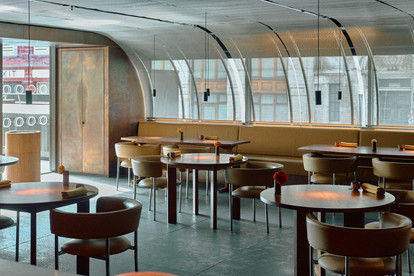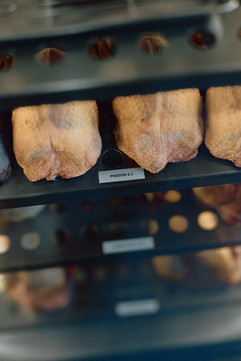IKOYI** – London (No.15 in The World’s 50 Best)
- Florio Anthony
- Oct 14, 2025
- 3 min read

Divisive. Spicy. Clean. Not just a little.
Three months ago, as part of my work, I had the chance to dine at Ikoyi , in London — this two-Michelin-starred restaurant, recently propelled to 15th place in the World's 50 Best 2025 . And above all, I had the privilege of being welcomed by chef Jeremy Chan himself. Before even sitting down to eat, I was treated to a tour of the owner and a few discussions with Jeremy, who told me about his vision, his approach to taste, the balance of textures, but above all, the central role of spices — these West African spices that he glorifies without ever falling into folklore. He also showed me some of his gems, like this Cornish beef, aged three months on site and then refined for a month in the restaurant's cellar. Already there, we understand: here, nothing is left to chance.
The Ikoyi shock: love it or hate it
Before going, I had taken care to read quite a few reviews—and it's an understatement to say they were polarized. Between " gastronomic scam ," " Michelin doesn't understand anything anymore ," or " worst meal of my life ," and at the other extreme, " unbelievable sensory experience ," " best meal of my life "... I knew I was going to enter a field of gastronomic tension.
What if we put the church back in the middle of the village?
A polished aesthetic, a decor that sets the tone
Located in the highly confidential 180 Strand, the restaurant has all the hallmarks of a contemporary setting: patinated copper, flowing lines, and fine tableware. It's closer to a gallery than a bistro. It's understated, assertive, and almost silent. It sets the stage for a cuisine that will speak loudly.
A cuisine of contrasts, which takes risks
The tasting menu is offered at £350 , with no indication of a course. We proceed blindly, but with a sure guide. I found what I often look for in a great kitchen: tension . Nothing is lukewarm here. Smoky jollof rice , perfectly calibrated in umami, arrives in a steaming black bowl, followed by aged turbot, served with egusi miso (dried and fermented melon seeds). It's technical, precise, brutal at times.
It's not all perfect (but still excellent). One amuse-bouche, combining beef, trout, asparagus, and candied orange, struck me as "unnecessarily complex." But that's the kind of misstep you forgive those who really try. Because the intention is clear: to upset , provoke , stimulate .
For whom? For those who have the basics.
As Orelsan would say, “if you don't have the basics, you're screwed from the start.” Ikoyi isn't a restaurant that caters to expectations. It breaks down benchmarks. If you're not curious, if you like to know what you're eating before it's even on your plate, or if the slightest hint of chili pepper makes you panic, move on.
But if you're open-minded, if you like it when food challenges rather than caresses, then Ikoyi might just be a shock. Not necessarily an immediate crush—but an experience that stays with you. Like a movie you didn't understand right away, but whose intelligence haunts you days later.
Personal verdict
Ikoyi is signature cuisine, and, for me, great signature cuisine. Like any author, Jeremy Chan divides. He creates a powerful score, without seeking to please at all costs. As a director or photographer, I always seek the narrative, the message. And here, the message is clear: to put the spice back at the center of the story, without ever turning it into "food porn" or folklore.
So yes, it itches. Yes, it stings. And yes, it's divisive. But above all, it's a restaurant you won't forget.




































































Comments